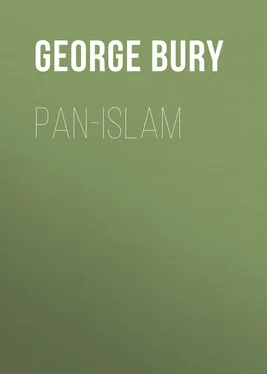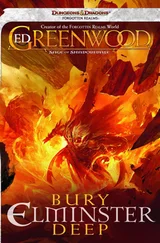George Bury - Pan-Islam
Здесь есть возможность читать онлайн «George Bury - Pan-Islam» — ознакомительный отрывок электронной книги совершенно бесплатно, а после прочтения отрывка купить полную версию. В некоторых случаях можно слушать аудио, скачать через торрент в формате fb2 и присутствует краткое содержание. Жанр: foreign_antique, foreign_prose, на английском языке. Описание произведения, (предисловие) а так же отзывы посетителей доступны на портале библиотеки ЛибКат.
- Название:Pan-Islam
- Автор:
- Жанр:
- Год:неизвестен
- ISBN:нет данных
- Рейтинг книги:4 / 5. Голосов: 1
-
Избранное:Добавить в избранное
- Отзывы:
-
Ваша оценка:
- 80
- 1
- 2
- 3
- 4
- 5
Pan-Islam: краткое содержание, описание и аннотация
Предлагаем к чтению аннотацию, описание, краткое содержание или предисловие (зависит от того, что написал сам автор книги «Pan-Islam»). Если вы не нашли необходимую информацию о книге — напишите в комментариях, мы постараемся отыскать её.
Pan-Islam — читать онлайн ознакомительный отрывок
Ниже представлен текст книги, разбитый по страницам. Система сохранения места последней прочитанной страницы, позволяет с удобством читать онлайн бесплатно книгу «Pan-Islam», без необходимости каждый раз заново искать на чём Вы остановились. Поставьте закладку, и сможете в любой момент перейти на страницу, на которой закончили чтение.
Интервал:
Закладка:
They came from all over the Moslem world. There were one or two Russian pilgrims returning from Mecca to be snapped up by the military authorities at Damascus railway station when they got out of the pilgrim train from Medina. There were cabdrivers from Jerusalem, a stranded pilgrim from China, several Tripolitans who had been roped in on the Palestine seaboard while trying to get a passage home, a Moor who tried to embrace my feet when I spoke of the snow-crowned Atlas above Morocco City (Marraksh) and told him that he would be landed at Tangier in due course – Inshallah. Of course we released, and repatriated as far as we could, men who were not Ottoman subjects and had obviously been forced into service against us. A few days later, when Jemal Pasha's army was getting into commissariat difficulties out in the Sinaitic desert (for the Staff had relied on entering Egypt), we began to get the real Turks among our prisoners.
I was very curious to ascertain if they had been worked up with pan-Islamic propaganda or carried any of it on them, for there was not even a Red Crescent Koran on any of the Arabic-speaking prisoners. A search of their effects revealed a remarkable phase of propaganda. There was hardly any religious literature except a loose page or two of some pious work like the "Traditions of Muhammad," but there were quantities of rather crude (and very lewd) picture-cards portraying soldiers in Turkish uniform outraging and murdering nude or semi-nude women and children, while corpses in priestly garb, shattered crucifixes, and burning churches indicated the creed that was being so harried and gave the scene a stimulating background. From their appearance I should say these pictures were originally engraved to commemorate Balkan or Armenian atrocities, but their possessors, on being closely questioned, admitted that the impression conveyed to them was of the joyous licence which was to be theirs among the Frankish civilians after forcing the Canal. One Kurdish gentleman had among his kit fancy socks, knitted craftily in several vivid colours, also ornate slippers to wear in his promised palatial billet at Cairo. There were some odd articles among the kit of these Turkish prisoners, to wit, a brand-new garden thermometer, which some wag insisted was for testing the temperature of the Canal before immersion, and a lavatory towel looted from the Hejaz railway. Still, nothing was quite so remarkable as a white flag with a jointed staff in a neat, compact case which had been carried by a German officer. Among his papers was an indecent post-card not connected, I think, with propaganda of any sort, as it portrayed a bright-coloured female of ripe figure and Teutonic aspect, wearing a pair of long stockings and high-heeled shoes, and bore the legend "Gruss von München."
A certain coyness, or possibly an appreciation of their personal value, kept most of the German officers from actual contact with our line. Only one reached the Canal bank, and he is there still. The German touch, however, was much in evidence. There were detailed written orders about manning the pontoons, not to talk, cough, sneeze, etc., and for each man to move along the craft as far as feasible and then sit down. They seem to have relied entirely on surprise, and ignored the chance of its occurring on the wrong side of the Canal. The emergency rations too which we found on the earlier batches of prisoners had a distinctly Teutonic flavour – they were so scientifically nourishing in theory and so vilely inedible in practice. They were a species of flat gluten cake rather like a dog-biscuit, but much harder. An amateur explosive expert of ours tested one of these things by attempting detonation and ignition before he would let his batch of prisoners retain them, which, to do their intelligence justice, they were not keen on doing, but offered any quantity of the stuff for cigarettes. We ascertained from them that you were supposed to soak it in water before tackling it in earnest, but as the only supply (except the runlet they still carried on them) was in the fresh-water canal behind our unshaken line, such a course was not practicable; the discovery of a very dead Turk some days later in that canal led to the ribald suggestion that he had rashly endeavoured to eat his ration. Our scientist laid great stress on its extraordinary nutritive properties, but desisted, after breaking a tooth off his denture, in actual experiment.
German influence, too, was apparent in the relations between officers and men. A Turkish yuzbashi was asked to get a big batch of prisoners to form two groups according to the languages they spoke – Arabic or Turkish. It was not an easy task in the open on a pitch-black night, but he did it with soldierly promptitude and flung his glowing cigarette end in the face of a dilatory private. As a natural corollary it may be mentioned here that one or two of our prisoners had deserted after shooting officers who had struck them.
For some days after the battles of Serapeum and Toussoum we expected another attempt, but they had been more heavily mauled than we thought at first. The dead in the Canal were kept down by the weight of their ammunition for some time, and the shifting sand on the Sinaitic side was always revealing hastily-buried corpses on their line of retreat.
Jemal Pasha hurried back to Gaza and published a grandiloquent report for Moslem consumption, to the effect that the Turks were already in Cairo (as was indeed the case with many hundreds), and that, of the giaour fleet, one ship had sunk, one had been set on fire, and the rest had fled. Two heavy howitzers, as a matter of fact, had managed by indirect fire from a concealed position to land a couple of projectiles on the "Hardinge," which was not originally built for such rough treatment, being an Indian marine vessel taken over by the Navy. She gave more than she got when her four-point-sevens found the massed Turkish supports.
A great deal of criticism has been flung at this first series of fights on the Canal, mostly by Anglo-Egyptian civilians. They asked derisively whether we were protecting the Canal or the Canal us. The answer is in the affirmative to both questions. Ordinary steamer traffic was only suspended for a day during the first onslaught, and the G.O.C. was not such a fool as to leave the Canal in his rear and forgo the defensive advantage. There are some who, in their military ardour, would have had him pursue the enemy into the desert, forgetting that to leave a sound position and pursue a superior force on an ever-widening front in a barren country which they know better than you do and have furnished with their own supply-bases is just asking for trouble. Our few aeroplanes in those days could only reconnoitre twenty miles out, and there was no evidence that the enemy had not merely fallen back to his line of wells preparatory to another attempt. We had not then the men, material, or resources for a triumphant advance into Sinai; it was enough to make sure of keeping the enemy that side of the Canal with the Senussi sitting on the fence and Egypt honeycombed with seditious propaganda.
Anyone at all in touch with native life in Cairo could gauge the extent of propagandist activity by gossip at cafés and in the bazars. The Senussi was marching against us. India was in revolt and the Indian Army on the Canal had joined the Turks. The crowning stroke of ingenuity was a tale that received wide credence among quite intelligent Egyptians. It was to the effect that the Turks had commandeered an enormous number of camels and empty kerosene tins. This was quite true so far, but the yarn then rose to the following flight of fancy: These empty tins were to be filled with dry cement and loaded on camels, which were to be marched without water for days until they reached the Canal, when the pangs of thirst would compel them to rush madly into the water. The cement would solidify and the Faithful would march across on a composite bridge of camel and concrete. Our flotilla was to be penned in by similar means.
Читать дальшеИнтервал:
Закладка:
Похожие книги на «Pan-Islam»
Представляем Вашему вниманию похожие книги на «Pan-Islam» списком для выбора. Мы отобрали схожую по названию и смыслу литературу в надежде предоставить читателям больше вариантов отыскать новые, интересные, ещё непрочитанные произведения.
Обсуждение, отзывы о книге «Pan-Islam» и просто собственные мнения читателей. Оставьте ваши комментарии, напишите, что Вы думаете о произведении, его смысле или главных героях. Укажите что конкретно понравилось, а что нет, и почему Вы так считаете.












